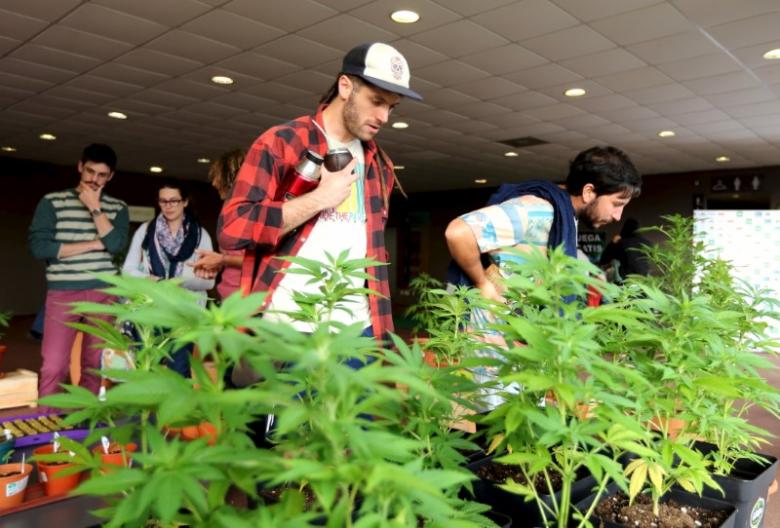Here's the truth about whether cannabis causes psychosis – and what you can do to minimise your risk of harm
As an expert in mental health, I would say that the biggest risk to anyone who uses cannabis remains their exposure to tobacco, which is a far more dangerous substance


Your support helps us to tell the story
From reproductive rights to climate change to Big Tech, The Independent is on the ground when the story is developing. Whether it's investigating the financials of Elon Musk's pro-Trump PAC or producing our latest documentary, 'The A Word', which shines a light on the American women fighting for reproductive rights, we know how important it is to parse out the facts from the messaging.
At such a critical moment in US history, we need reporters on the ground. Your donation allows us to keep sending journalists to speak to both sides of the story.
The Independent is trusted by Americans across the entire political spectrum. And unlike many other quality news outlets, we choose not to lock Americans out of our reporting and analysis with paywalls. We believe quality journalism should be available to everyone, paid for by those who can afford it.
Your support makes all the difference.When you have over 2 million people trying cannabis in the last year, the odds are that some of them already have or will go on to have mental health problems such as psychosis.
It would be handy to know who is the most likely to develop such a problem. Science should be able to provide some clues as researchers first began looking into the link between cannabis and psychosis in the Seventies, so we’ve had nearly 50 years to figure this one out. But science rarely churns out binary answers to questions and the cannabis psychosis conundrum is no different.
What has become clearer is that the more cannabis you smoke, the greater your risk of becoming psychotic – this is often referred to as the “dose-response” relationship. This means that a small group of people face the highest risk, as a mere 9 per cent of users get through 73 per cent of all the cannabis consumed. Also, for people who already have schizophrenia, cannabis can make the hallucinations and thought disorder they experience worse; they also take longer to recover from these when they do get treatment.
To get a sense of the size of the risk, we would need roughly 23,000 people to abstain from ever using cannabis to prevent one of them from becoming psychotic. That’s based on the research carried out to date. But the research isn’t perfect: one particular flaw stands out – most of it was conducted when people were using lower potency cannabis like resin.
There have been no studies large enough or sophisticated enough since higher potency versions of cannabis like skunk came along. Higher potency cannabis contains less cannabidiol (CBD), which is believed to offer some protection from developing problems such as psychosis, but higher levels of tetrahydrocannabinol (THC), which can trigger psychosis. So it’s possible that we might need fewer people to abstain from cannabis to stop one of them developing a mental health problem if higher potency strains increase the risk. But we just don’t know.
Trying to figure out what difference, if any, the change in cannabis potency has made to rates of psychosis and schizophrenia some people suggest looking at the rate of schizophrenia and psychosis in the population over time. Initially this makes sense, but this data is problematic and influenced by its own set of unique problems which makes any interpretation difficult.
So, although the science is messy, there are things we can do to help reduce the potential for harm. A survey carried out for The Independent last year showed public opinion warming up to the idea of regulating cannabis. Regulation could help reduce the risks to health that cannabis use poses, as a regulated cannabis market would introduce some quality control.
This would provide users with information about the strength of cannabis on offer, something they usually only discover after exposure in the current unregulated market. Later this year, scientists at the Institute of Psychiatry will carry out research to find the optimal balance between tetrahydrocannabinol (THC) and cannabidiol (CBD) so that advice to users can be given on how to minimise the potential for developing mental health problems.
However, the greatest risk for most people who use cannabis continues to be exposure to tobacco. In the UK, we are uniquely wedded to the habit of combining tobacco with cannabis in a joint, unlike our American counterparts who ingest cannabis on its own.
For many young people, their introduction to tobacco is via a cannabis joint, increasing the chance of developing tobacco dependence. Regulation could help to break this habit, as information about such risks would be less hampered by the constraints of a substance that falls under the Misuse of Drugs Act.
Ultimately, although the public health message about the link between cannabis and psychosis has been a difficult one to communicate, the clearest advice we can offer with the greatest potential benefit is to leave out the tobacco from your joint.
Ian Hamilton is a Lecturer in Mental Health in the Department of Health Sciences at the University of York
Join our commenting forum
Join thought-provoking conversations, follow other Independent readers and see their replies
Comments